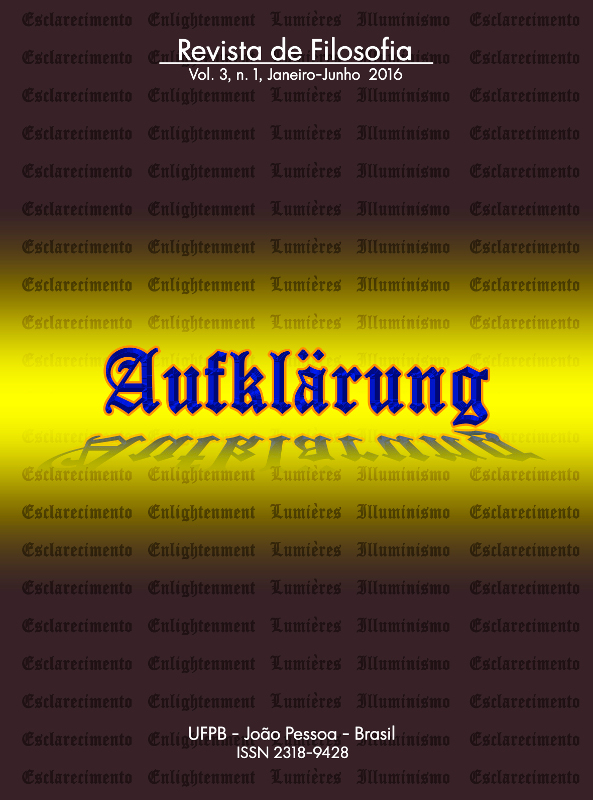Maxwell’s defense of revolution, or how academia can help transform and save the world
DOI:
https://doi.org/10.18012/arf.2016.27930Palavras-chave:
Education, Philosophy, Science, Wisdom, Inquiry, Academic Revolution Global ProblemsResumo
Review of Maxwell, N. (2014) Global philosophy: What philosophy ought to be? Exeter, UK: Imprint-Academic, Societas – Essays in Political & Cultural Criticism. (Pb, pp.192. ISBN 9781845407674).
In his recent book, Nicholas Maxwell revisits for the most part ideas, arguments, and positions he has been defending quite forcefully for the past 40 years or so. These include his conceptions of what philosophy ought to be, about the nature of science and its progress-making features, how to best construe empiricism and rationality, his take on the history and philosophy of science, on philosophy and the history of philosophy, the nature of (academic) inquiry, and finally, his position about the role of education and the university more generally in view of his rather pessimistic yet compellingly realistic diagnosis of the problems and challenges confronting our world at this point in our history.
Downloads
Referências
Cioffi, F. (1998) Wittgenstein on Freud and Frazer. Cambridge: Cambridge University Press.
Critchley, S. (2015) ‘There is no theory of everything’. The Stone (New York Times), September 12, 2015.
Deleuze, G. and F. Guattari (1994) What is philosophy? London: Verso Books.
Ferrari, M. and G. Potworowski (2008) Teaching for wisdom: Cross-cultural perspectives on fostering wisdom. Springer: Science & Business Media, Philosophy.
Lipman, M. (1974). Harry Stottlemeier's discovery. New Jersey: Institute for the Advancement of Philosophy for Children.
Longino, H. (1990) Science as Social Knowledge: Values and Objectivity in Scientific Inquiry. NJ: Princeton University Press.
Maxwell, N. (1984) From knowledge to wisdom: A revolution in the aims and methods of science. Oxford: Blackwell.
Maxwell, N. (2007) From knowledge to wisdom: A revolution for science and the humanities (Expanded 2nd Ed). London: Pentire Press.
Mengel, T. (2010) ‘Learning that matters – Discovery of meaning and development of wisdom in undergraduate education’. Collected Essays on Learning and Teaching (CELT), Vol. III, pp.119-123.
Sternberg, R.J. (2001). ‘Why schools should teach for wisdom: The balance theory of wisdom in educational settings’. Educational Psychologist 36(4): 227-245.
Arquivos adicionais
Publicado
Como Citar
Edição
Seção
Licença
Política de Direito Autoral para os itens publicados pela Revista:
1.Esta revista é regida por uma Licença da Creative Commons aplicada a revistas eletrônicas. Esta licença pode ser lida no link a seguir: Creative Commons Attribution 4.0 International (CC BY 4.0).
2.Consonante a essa politica, a revista declara que os autores são os detentores do copyright de seus artigos sem restrição, e podem depositar o pós-print de seus artigos em qualquer repositório ou site.
Política de Direito de Uso dos Metadados para informações contidas nos itens do repositório
1. Qualquer pessoa e/ou empresa pode acessar os metadados dos itens publicados gratuitamente e a qulquer tempo.
2.Os metadados podem ser usados sem licença prévia em qualquer meio, mesmo comercialmente, desde que seja oferecido um link para o OAI Identifier ou para o artigo que ele desceve, sob os termos da licença CC BY aplicada à revista.
Os autores que têm seus trabalhos publicados concordam que com todas as declarações e normas da Revista e assumem inteira responsabilidade pelas informações prestadas e ideias veiculadas em seus artigos, em conformidade com a Política de Boas Práticas da Revista.






































